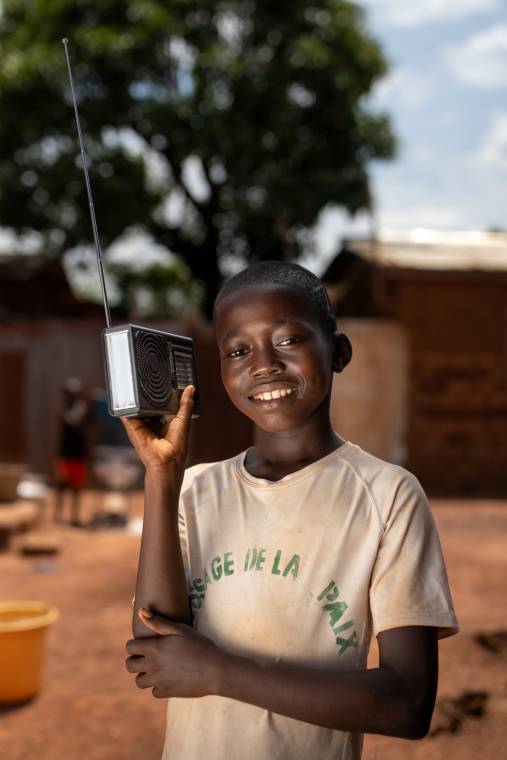Can we measure the impact of a news radio station on a particularly vulnerable population in a country in crisis ? The installation of Radio Ndeke Luka's new FM transmitter in Beloko, Central African Republic, presented an opportunity to conduct a field study measuring the impact of our radio station before and after its introduction in this remote region of the country. The results of this study reveal a concrete impact and an evolution in the perception of the listeners, particularly on disinformation.
Methodology :
To measure the impact of exposure to our media outlet in the Central African Republic, Radio Ndeke Luca (RNL), we took advantage of the launch of RNL's 24-hour broadcast with a new FM transmitter in the Beloko area (Nana-Mambéré prefecture, in the far west, near the border with Cameroon) to conduct pre- and post-transmitter installation surveys. The first survey was conducted between November 26 and December 2, 2021. The transmitter was installed in mid-December, and the second survey was conducted between 10 and 15 March 2022.
Interviewers, drawn from IMMAR Research & Consultancy's local network, followed a protocol developed by Dr. Jeff Conroy Krutz, Associate Professor in the Department of Political Science at Michigan State University, to ensure random selection of participants, all of whom were of legal age, and to ensure a balance of men and women. A total of 568 people were interviewed before the transmitters were installed and 558 after.
Measured Effects :
Attitude toward RNL and assessment of the media environment in CAR :
After the start of its FM broadcast, RNL enjoyed an extremely high level of trust from respondents :
- 84% said they completely trusted the information coming from RNL. This is four times more trustworthy than the other main radio stations available locally.
- RNL is seen as fairly unbiased. 56% said the station was neutral, a rate twice as high as other radio stations.
Perceptions of fairness in media coverage increased significantly:
- The percentage saying "the media provided fair coverage of all candidates" in the 2020 and 2021 election campaigns increased from 59% to 70% (+11%).
- Respondents were much more supportive of media pluralism.
However, support for media freedom and perceptions of media effectiveness in fighting corruption remained statistically unchanged, and perhaps paradoxically, perceptions of media freedom declined.
Support for democratic and inclusive principles :
The introduction of RNL contributed to a significant increase in support for democratic institutions and principles such as tolerance and nonviolent conflict resolution, with the following measured effects:
- Rejection of one-party and military rule as an alternative to democracy increased significantly.
- Citizen engagement in elections increased.
- Increased willingness to abide by certain democratic principles, such as respect for results, even if it means letting political opponents rule.
- Significant increase in opposition to undemocratic practices by candidates to win elections (vote buying; hate speech; ballot box stuffing; voter intimidation; use of violence). Thus, the proportion rejecting violence as an electoral tactic increased from 48% to 57% (+9%).
- The proportion saying violence was justified in a range of scenarios decreased significantly (e.g., "protecting your land from theft").
Support for the regime of an "all-powerful" president remained statistically unchanged. As an unanticipated effect, respondents became more likely to identify with their ethnic group rather than their Central African nationality, likely reflecting a lack of national cohesion in the country.
Political Behavior and Engagement :
RNL contributed to an increase in participation in local community meetings.
However, there was no significant change measured in respondents' interest in politics. In fact, there was a decline in citizens' sense of internal and external efficacy (i.e. the sense of personal capacity to create change, and the responsiveness of institutions); as well as a decline in confidence that officials would actually act to solve certain problems. These results may reflect a greater awareness of the malfunctioning of the democratic system.
Practice and attitude regarding false information :
In response to this scourge, RNL contributed to :
- An increased perception of the dangers of misinformation, with the percentage of people stating that it was harmful to CAR increasing from 28% to 39% (+11%)
- Increased confidence in people's ability to discern truth from falsehood.
- The proportion of people who said they would try to verify the truth of the information increased from 33% to 59% (+26%). Similarly, the proportion of people who said they would share information immediately went from 22% to 10% (-12%).
- The percentage of people who consider radio to be their primary source of information increased from 13% to 27% (+14%).
The results of the study, including data collected in other locations, including Bangui, Obo and Birao, will be published in 2023.
For more information: Diese E-Mail-Adresse ist vor Spambots geschützt! Zur Anzeige muss JavaScript eingeschaltet sein!.




